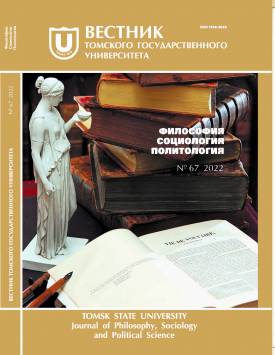The ontological meaning of the category “virtual reality” in the context of the formation of the digital paradigm
This article discusses the problem of determining the ontological meaning of the category “virtual reality” in the context of the formation of the digital paradigm. Currently, in the era of the implementation of the megatrends of the fourth industrial revolution (Industry 4.0), the interdisciplinary consideration of such a sociocultural and technical phenomenon as virtual reality (VR) is being updated. Virtual reality as a given (along with objective and subjective reality), as an integral part of the modern worldview, determines the philosophical research and determination of its ontological status. The historical and philosophical analysis of metaphysical concepts carried out in this work focuses on the ontological possibility of virtual reality. The analysis shows that various philosophers and philosophical traditions have addressed the question of the ontological possibility of reality, different from the usual reality of the surrounding world, and answer it as follows: any reality is ontologically possible due to the action of certain laws of change in general and the implementation of the process “from possibility (dynamism) - through action (energy) - to realizability (entelechy)” (Aristotle); the ontological possibility of any reality finds its potential in our consciousness, because “everything is consciousness” (yogachara); transcending, going beyond the usual empirical explanation of reality, determines the manifestations of the a priori form of pure reason, expressed in the conclusion about the ontological possibility of reality (Kant). Thus, the thesis about the ontological possibility of any reality, including virtual reality, which in the process of implementation acquires objective (materialized, felt) and subjective (thought) characteristics, is substantiated. Currently, virtual reality is a full-fledged reality that has an ontological status, acquired during the creation and implementation of digital technologies, for example, such as virtual (VR), augmented (AR), mixed (MR) reality, the main purpose of which from a scientific point of view is to substantiate the digital picture of the world (digital paradigm), and from a sociocultural point of view to improve the quality of life of a modern person. The author declares no conflicts of interests.
Keywords
ontology, historical and philosophical analysis, digital paradigm, virtual realityAuthors
| Name | Organization | |
| Burlutskiy Andrey N. | Russian Customs Academy | aburlutskiy@mail.ru |
References

The ontological meaning of the category “virtual reality” in the context of the formation of the digital paradigm | Tomsk State University Journal of Philosophy, Sociology and Political Science. 2022. № 67. DOI: 10.17223/1998863X/67/2
